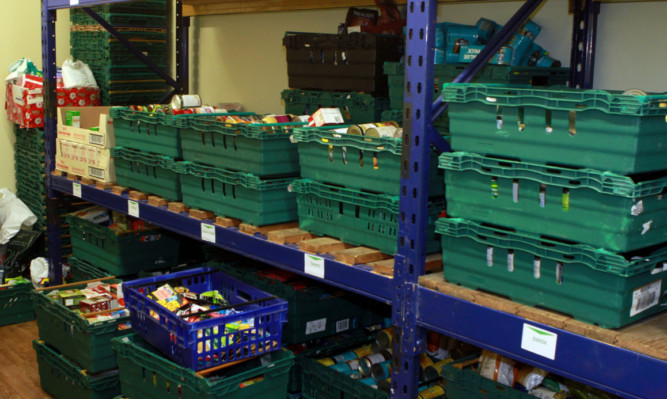Almost one in five people using foodbanks need the service because their wages do not cover the household bills, a leading charity worker has revealed.
Ewan Gurr, Scotland development officer for the Trussell Trust, told The Courier that Dundee is still Scotland’s busiest foodbank as he called for radical reforms to help take working people out of poverty.
The Courier visited the city’s foodbank to meet those volunteering, working at and using the service to hear the stories of those involved.
Across Scotland 6,671 people have used a foodbank in the past year and, although the number attending because of benefit delays or changes has remained largely static, there has been an increase from 13% to 18% in people who have been left desperate because of low income.
Mr Gurr said: “There is now an emerging trend, which is people are just finding their income is not stretching as far as it used to because of the rising cost of living.
“There is rising in-work poverty. Almost one-fifth of people using foodbanks in Scotland are doing so because of low income.”
Mr Gurr added that zero hours contracts meant some workers end up with irregular hours and, as a result, erratic pay packets, with no guarantee of enough money to pay the weekly shopping bill.
He also suggested giving companies tax-break incentives to pay the living wage to their staff. At the moment the minimum wage is £6.50 per hour but campaigners want to see at least £7.85 per hour paid to workers.
The subject has been a hot topic at both Holyrood and Westminster, with disputes over if and how any changes can be implemented.
“If you are talking about low pay you could incentivise by offering a corporation tax cut for those who implement the living wage,” Mr Gurr said.
“Making sure that people are paid a fair wage is going to reduce the number of people who turn up to foodbanks.”
SNP MSP Stuart McMillan also raised the issue with First Minister Nicola Sturgeon last week, calling the fact any Scot is forced to use a foodbank “unacceptable” and “appalling”.
Ultimately though, Mr Gurr said the best way to help people is to get involved at a local level.
He added: “Our primary focus has always been on the type of power that lies in communities, not the corridors of power.
“We have always been about the practical alleviation of food poverty.”No easy answers, say volunteersHuw Stansfield works offshore for four weeks in every six but still finds time to volunteer at the Dundee foodbank on Constitution Street, writes Sandra Gray.
The Broughty Ferry man dedicates two afternoons a week to sorting out food donations and ensuring people get the things they desperately need.
Mr Stansfield said the priority for the UK and Scottish Governments should be to ensure people don’t slip through the cracks and end up in poverty.
He added: “The bottom line is that we have to stop people getting into this position in the first place.
“We have to figure out a way to get them the best start in life, whether it’s through training or employment.
“I don’t think that will happen too soon in today’s economy, however. We can either ignore the problem and hope it goes away, or start helping.”
Marjory Stewart, a teacher from Dundee, has been getting her pupils involved in helping the city’s foodbank.
She believes the Scottish Government has “limited” powers to tackle food poverty and has urged communities to start looking out for each other.
She said: “If more people did a little a bit, it would make us a better community.
“Just adding a little bit extra to their messages and taking a little more time to go and do something would be a big help.
“There’s too much of an ‘I’m all right Jack’ attitude. People need to look out for one another more.”
